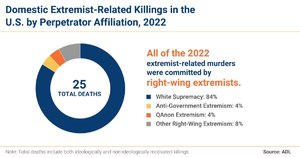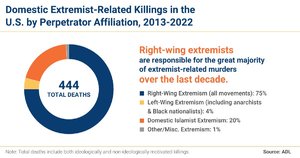For the narrow purposes of this report, COE defines ideological murders as killings directed against perceived enemies, as well as other people, such as police or bystanders, who may get in the way of or try to stop such attacks. The Center on Extremism defines non-ideological murders as murders for which the motive is unclear, murders committed to benefit an extremist group or members thereof (such as killing internal or external rivals, or suspected informants) and murders committed for traditional motives such as greed, anger or jealousy. These can include domestic violence murders as well as murders related to criminal enterprises such as drug-dealing, in which many white supremacist gangs engage.
All these types of murders are conservatively classified in this report as “non-ideological,” even though it is possible that extremism still played at least some role in many. It is important to account for such killings, as to do otherwise would offer a misleadingly small sense of the dangers that extremists pose—after all, a murder is a murder. Moreover, there is considerable public interest in some of these subjects—such as the link between extremism and domestic violence.6










